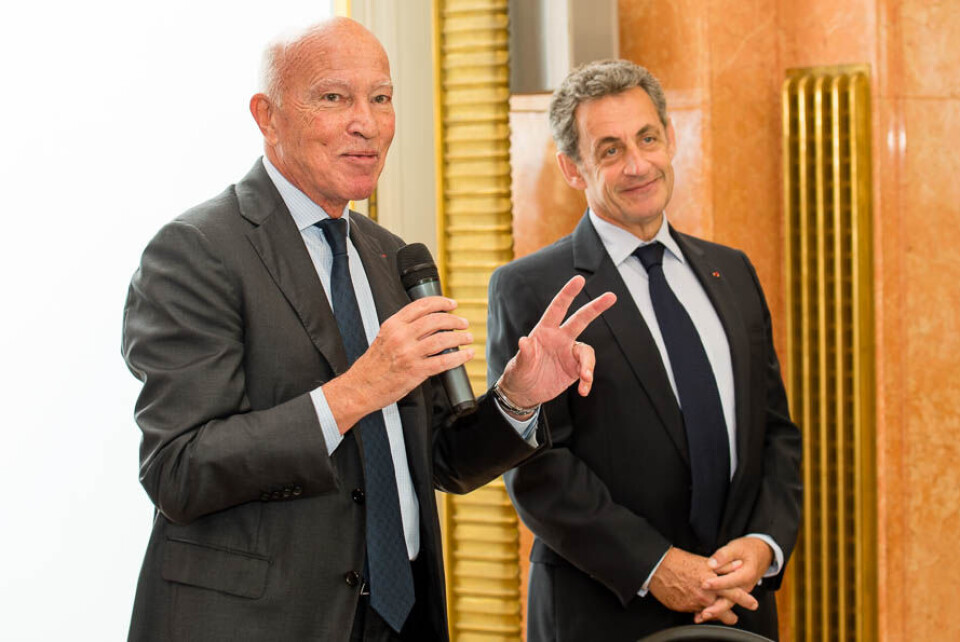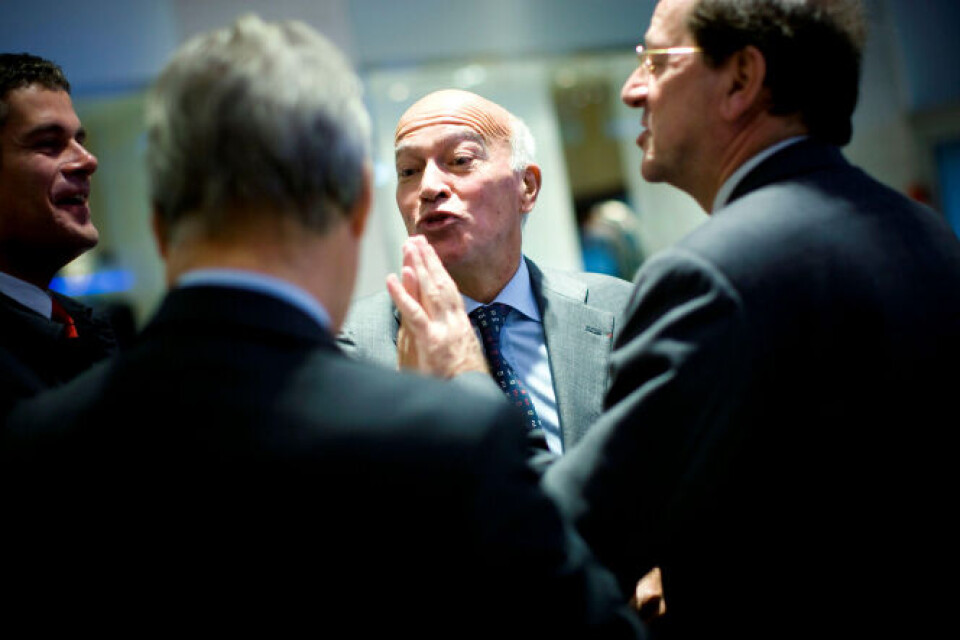-
Small lakeside French hamlet to be sold at auction - starting price €450,000
The tourist site has a collection of 13 gîtes and a swimming pool
-
Photos: The 14 villages vying to be France’s favourite in 2025
See the full shortlist and vote for your favourite
-
Ranking shows the best places to live in France in 2025
A wide range of data and thematic criteria was used to sort 34,935 communes nationwide
Meet Nicolas Sarkozy’s former communications chief, Thierry Saussez
He discusses his brainchild Villes & Villages: où il fait bon vivre, and his business that aims to defeat French pessimism

No matter how recently you moved to France, chances are you already know about one of the country’s most popular rankings.
But do you know the man behind it?
Thierry Saussez is the mastermind of France’s Villes & Villages: où il fait bon vivre, roughly translated as ‘the best towns and villages to live in.’
It ranks the best 500 towns and villages, and releases the list in partnership with French newspaper Le Journal du Dimanche.
Every year it generates a flurry of articles in the regional and national press.
In 2023, Angers (Maine-et-Loire) came top (for the second time in a row) in the town category, and Guéthary (PyrénéesAtlantiques) came first in the village ranking.
This fourth edition, much like its predecessors, was a great PR success. And this is not by chance.
Mr Saussez is often called the ‘Jacques Séguéla of the Right’, referring to the marketing expert known for the successful electoral ad campaigns he created for former president François Mitterrand in 1981 and 1988.
Mr Saussez was once the communications chief to former president Nicolas Sarkozy, and remains one of his strongest supporters.
It has been suggested in the press that the Villes & Villages ranking is a disguised political tactic to spread rightwing ideas among France’s towns and villages ahead of France’s next presidential election in 2027.
The Connexion asked him about the ranking and what it tells us about France and its people in 2023.
We also spoke about another business he founded in 2014, Le printemps de l’optimisme (the spring/dawn of optimism), which aims to spread optimism among the notoriously pessimistic French population.

How does a town or village succeed in the Villes & Villages ranking?
French people were asked in a survey to name the most important aspects of good living.
They chose: air quality; security; health; transportation; shops and services; protection of the environment; education; community spirit; sports and leisure, and quality of housing.
The ‘best-to-live-in’ town or village is ranked by these ten categories, using data from Insee and other governmental bodies.
The results are weighted depending on the importance of each category to produce the most accurate and scientific ranking possible.
In this fourth year of the ranking, I see 69% of people have named security as the most important category. Has this always been the case?
Quality of life is the most important, but security comes second.
This has been the case since the first year of the ranking.
Health is climbing up in the ranking after the end of the Covid crisis, but there seems to be a delayed effect here.
However, French people seem more attached to health infrastructure than ever before.
Other important factors in the ranking are proximity to urban towns with good services, and with a ‘village life’ atmosphere in mid-sized towns.
The ranking confirms a trend first noticed by sociologists – a renewed interest in mid-sized towns and villages.
It highlights the desire of French people to be close to mid-sized cities and nature, something accentuated by the pandemic with lockdowns and remote working.
This is the best recipe for happiness.
Do you agree that French people are ‘living the dream’ with their pavillon houses, and now that they have attained it, they do not want a ‘return to past times’?
Yes, I believe so. With the condition that they need to be close to an urban centre.
Not all villages and towns are making high rankings.
Look at towns such as Boulogne-Billancourt, Asnières, Nogent-sur-Marne, and Saint-Germain-en-Laye around Paris.
They have better rankings than Paris itself. In Corsica, on the other hand, remote villages far from both Ajaccio and Bastia have poor rankings.
France has more than 30 labels. What do you bring to the table? Surely a Ville et village fleuris label indicates it is a good place to live...
I do not think so. Villes fleuries and ville internet are great, but they are thematic.
The only global label is ours.
It can be used for communication to promote the town, to trigger interest when welcoming newcomers.
It can be displayed on a sign.
An MP recently told me his phone was ringing off the hook even before the the ranking was made public.
It proves your communication skills. You are not nicknamed the ‘Jacques Séguéla of the right’ for nothing!
Well, I can only hope so.
What I can say is that it offers France one of the most spectacular nationwide PR opportunities to promote its villages and heritage.
The latest edition has generated more than 500 articles in the press, including yours!
Annecy’s PR team has chosen not to display the label, despite outstanding scores. Top-ranking Angers likewise has not promoted it yet. Is it just a matter of time before they do?
I believe so, yes.
The ranking is so popular that it can take time to convince mayors of the benefits of having a sign displayed at the town or village entrance.
Surely the mayor of Angers must be considering it, since it is the second year in a row that the town has topped our ranking.
This is free advertising!
About Annecy, they have dived in ranking over the years because of expensive rents.
This is not the most important category but it doesn’t work in their favour.
The biggest take away is the lack of interest by French people in big cities such as Marseille, Lyon, Bordeaux, Nantes and Paris, which all dropped ratings in our 2023 edition.
Some French villages have been re-populated by British immigrants. Have you studied the effects of this migration on the vitality of a region?
Yes. In the case of Creuse and departments in the centre, where there are the highest numbers of British people, it is probable that the resulting quality of life and house prices have boosted those towns and villages.
Now onto your battle for optimism. Are the French really so pessimistic?
France is a paradox.
While most French people say they are happy in their personal and professional lives, France is one of the most pessimistic nations in the world.
When you try to understand why, there is this idea that French people like to be frightened and like to scare themselves.
There is sort of a bias, a displayed pessimism, something journalists often cater to.
When I started the Printemps de l’optimisme, I was compared to an American…
I was going to ask you about the TV interview you gave in 2014 when you were first compared to an American… But why was it brought up in the first place?
There is confusion in France about being optimistic.
It is too often understood as being blissfully, unrealistically optimistic, in the way that Americans are often regarded.
This is absurd.
These are extremists of optimism responding to extremists of pessimism, people who have a different relationship with reality.
We are somewhere in the middle. French people are lucid optimists.
We know that life is as beautiful as it is fierce and unfair.
We know that there are no right or wrong answers.
But, most importantly, we know that it is during bad circumstances that good energy is needed the most.
Where does this perceived attitude come from? And why do you think British people and Americans are more optimistic than the French?
There is a stronger bias between personal optimism and collective pessimism in France.
France has both cultural and historical reasons.
Religion is the first reason.
Catholicism’s relationship with money is complicated – it took until Pope John Paul II to acknowledge the market economy.
Then there were revolutions against the privileged; Marxism gained a strong foothold in France; class warfare worked well.
Then there is the fact that the State is regarded as an institution which is required to accompany us from the cradle to the grave.
But when French people are sent the bill, it is always too high...
So, it’s complicated! (Laughs)
And then there is our outstanding educational system which develops critical thinking.
But when this system is pushed to the extreme, it creates depressive people asking themselves whether life is worth living or whether everything was better previously.
This is of course nonsense.
After the housing crisis in 2008, skyrocketing debt, global warming, wars in Yemen, Syria, and the migration exodus it triggered, then Covid, and now the war in Ukraine, you can’t deny a build up of negative events...
I do not deny it.
But it is precisely during tough times that we need to roll up our sleeves.
Life is not only about the good times.
I want to give credit to Martin Seligman, the creator of positive-thinking philosophy. Every scientific study shows that being positive is good for the brain.
When you wake up in the morning, think about something positive, your breathing pattern will slow down and you will spread happiness.
When you come to the office every morning, brighten the mood with a smile, thinking of a beautiful woman or man you have seen, a flower, or the landscape.
Express your gratitude.
Be thankful and everything will be better.
It is science.
More and more Brits have become pessimistic about the state of Great Britain following Brexit. Is that a victory for French pessimism?
Yes.
French writer Sylvain Tesson said that French people live in paradise while believing they are in hell.
They know it is a country with outstanding diversity, gastronomy, pioneering science, exceptional physicians, and a diversified economy.
It is still an agricultural and nuclear country and our language is spoken more and more around the world, contrary to popular belief.
Deep down, they know how lucky they are.
Related articles
France's 'best places to live': how is your town or village rated?
‘France’s favourite village’: See 14 contenders for this year’s vote
Where in France are people happiest - and what makes them happy?
























